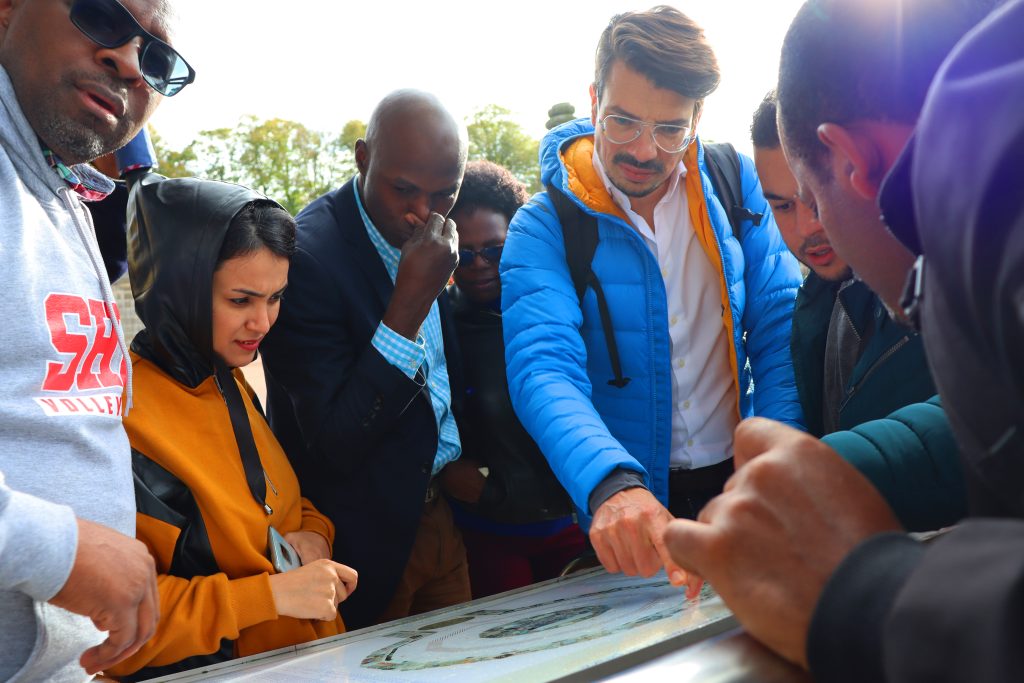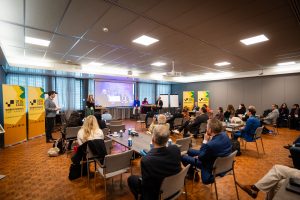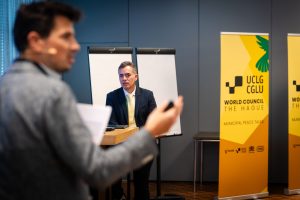“A New Peace Agenda for Future Generations” was the theme of the UCLG World Council 2024. The event, hosted by the City of The Hague and co-organised with UCLG and VNG (Association of Dutch Municipalities) International, brought together local government representatives from around the world to talk about sustainable impact of peacebuilding initiatives in local governance.
The Hague Academy for Local Governance, VNG International and UCLG facilitated a “Peace Learning Event on Urban Violence and City-to-City Diplomacy”, led by senior programme manager, Nicolas Haezebrouck. The event highlighted successful peacebuilding and social cohesion projects at a local level, from Brazil to Kenya, and a preview of our upcoming course Local Security and Peacebuilding that takes place in The Hague from 18 to 22 November will.

Challenges and Opportunities for Local Governments
A panel of experts explored the wider socio-economic consequences of urban violence, pointing to issues such as poverty, exclusion, lack of economic stability, and mistrust in governance.
Investing in social cohesion, safe public spaces, and economic opportunities emerged as possible strategies for reducing violence.
Peacebuilding practices have shown that the involvement of all stakeholders, including local government and civil society, is crucial. Grassroots organisations, like The Legend Kenya, represented by its founder Rose Mbone, are vital partners in these efforts. Rose Mbone stressed the positive impact of the collaboration between local governments and local communities; yet she also emphasized the need for more resources. “It is possible to have safer cities, but only if we trust the local communities with processes and resources”.
The Case of Recife: A Model for Urban Peacebuilding
The focal point of the workshop was the case study of Recife in Brasil, finalist of the UCLG Peace Prize 2022. The city has faced steep crime rates and social inequality. Paulo Moraes, Executive Secretary of Citizen Security of Recife shared how Recife’s Compaz Community Centres serve as a pillar of their urban peacebuilding strategy. These centres strengthen community engagement and social infrastructure by providing space for sports, arts, education, and public services, particularly focusing on children and youth from vulnerable communities.


Since the opening of these centres, Recife has witnessed a significant reduction of violent crimes and functions as role model for community-based initiatives to strengthen social cohesion. 29 more Brazilian cities with high crime rates are set to receive federal funding for a community centre of their own within the next few years.
As Paulo Moraes notes, “Compaz is only the beginning, not the end of our journey to urban peacebuilding.”
Looking Ahead: Strengthening Peacebuilding Efforts
One of the key takeaways from the learning event was the need for collaborative networks between cities that face similar challenges in order to exchange best practices and explore solutions together. As Dion van den Berg (PAX for Peace) concluded, “What we have seen today is not new. Many of the aspects of Compaz might already be in place. What might be needed is a network of cities who have community centres.”
The upcoming “Local Security Governance and Peacebuilding” course in The Hague from 18th-22nd of November provides such a network and is a platform for exchange of practical solutions to some of today’s most pressing challenges in peacebuilding, stabilisation and security sector reform. Through dialogue with fellow participants, expert input, and study visits, practitioners can deepen their understanding of local peacebuilding and play a pivotal role in establishing effective and sustainable peacebuilding programmes.
Find out more about the course here!
Related courses
We offer a diversity of courses throughout the year. Here are several other courses you might like.

